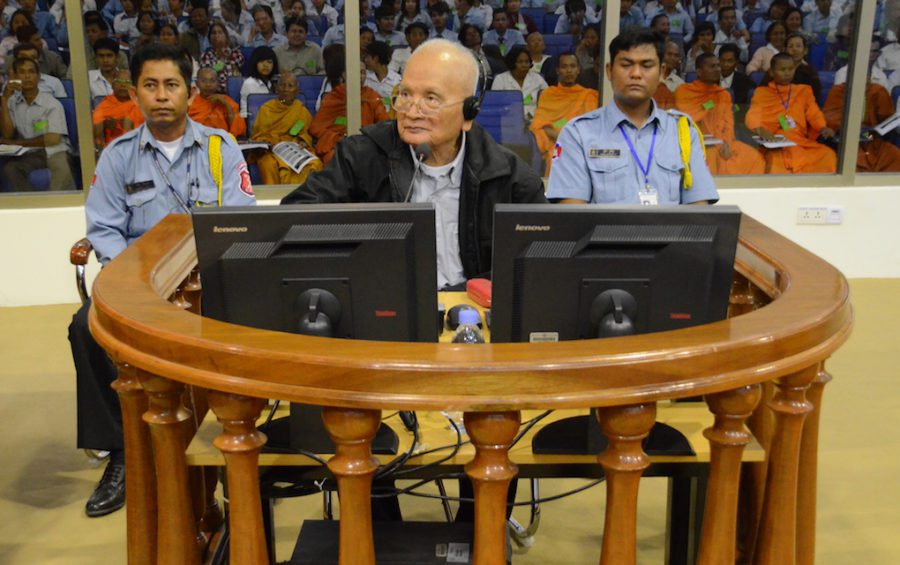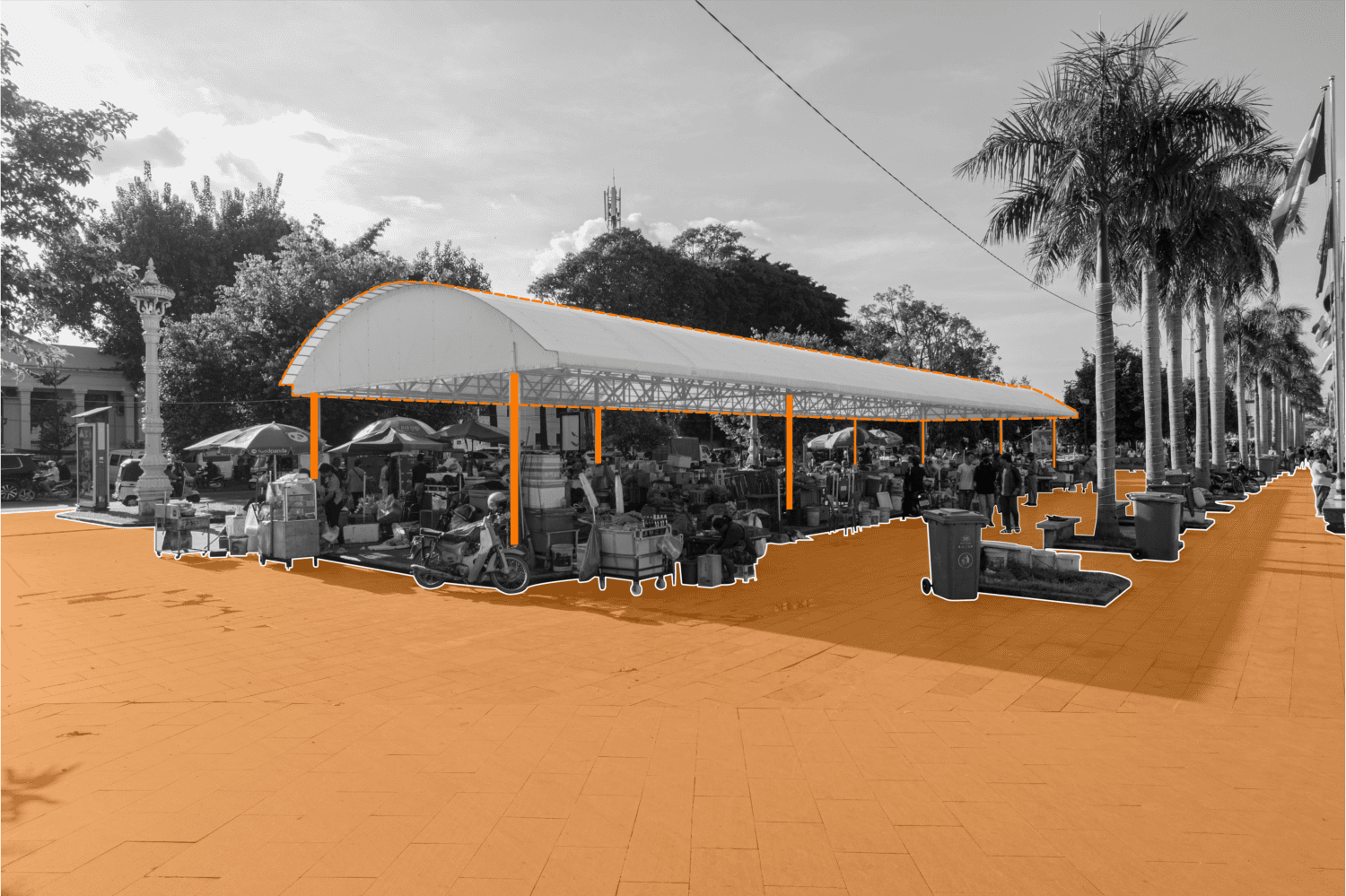Nuon Chea, one of only two senior Khmer Rouge leaders to have been convicted for the crime of genocide over the ultra-communist regime’s mass murder and other atrocities, died this week at the age of 93.
 Doreen Chen is a human rights attorney, international lawyer representing Nuon Chea, and co-founder and co-director of the legal NGO Destination Justice.
Doreen Chen is a human rights attorney, international lawyer representing Nuon Chea, and co-founder and co-director of the legal NGO Destination Justice. Henri Locard is a historian, former expert witness at the Extraordinary Chambers in the Courts of Cambodia and author of “Pol Pot’s Little Red Book: The Sayings of Angkar.”
Henri Locard is a historian, former expert witness at the Extraordinary Chambers in the Courts of Cambodia and author of “Pol Pot’s Little Red Book: The Sayings of Angkar.” Rebecca Gidley is lecturer and researcher at the Australian National University and author of “Illiberal Transitional Justice and the Extraordinary Chambers in the Courts of Cambodia.”
Rebecca Gidley is lecturer and researcher at the Australian National University and author of “Illiberal Transitional Justice and the Extraordinary Chambers in the Courts of Cambodia.” So Farina is a researcher, principal deputy director of the Documentation Center of Cambodia, where she heads the Cham Oral History Project, and author of “The Hijab of Cambodia: Memories of Cham Muslim Women after the Khmer Rouge.”
So Farina is a researcher, principal deputy director of the Documentation Center of Cambodia, where she heads the Cham Oral History Project, and author of “The Hijab of Cambodia: Memories of Cham Muslim Women after the Khmer Rouge.”
The former deputy communist party secretary was well-known for his strict adherence to the dogma of Democratic Kampuchea, loyalty to its leader Pol Pot and refusal to acknowledge his own culpability in the regime’s crimes.
“Brother Number Two” was sentenced to life in prison by the Khmer Rouge tribunal twice — once in 2014 for crimes against humanity and again last year for the genocide of minority ethnic Vietamese and Cham Muslims from 1975 to 1979.
In 2011, Chea testified before the tribunal, saying, “I don’t want the next generation to misunderstand history. I don’t want them to believe the Khmer Rouge are bad people, are criminals.”
“Nothing is true about that,” he said.
VOD asked two historians, a researcher and Chea’s defense attorney about his life, death and legacy. Here’s what they said.
How will Nuon Chea be remembered? How should he be remembered?

Although Nuon Chea is gone, his legacy remains. The legacy describes his genocidal policy, which caused about 2 million people’s deaths. This legacy will be remembered forever.

Nuon Chea will be remembered, quite appropriately, as a key architect of the Khmer Rouge’s policies which brought so much suffering to the country. With his appearance at the tribunal, he might also be remembered as a frail old man which is a reminder of both the challenges of delayed justice but also his status as just another person that time and age also caught up with.

Although Nuon Chea is portrayed as unrepentant, he repeatedly accepted moral responsibility for Cambodians’ suffering during Democratic Kampuchea. It is easy to dismiss him as a monster. However, it may be more useful to remember him as a fellow human — flawed though he was — and focus on understanding the conditions under which humans play a role in the suffering of others.

It depends by whom. One of his daughters, Lao Chea Linda, told the Phnom Penh Post at his funeral: “I’m very proud of my father as an individual, no matter how he is regarded by other people. For me, he is a well respected father who was good to his children. He was a strong man who never showed his children any weakness.”
Yet, Nuon Chea is not only one of the greatest criminals of the 20th century, but also the entire history of mankind. He had a particularly perverse and twisted mind, bordering on the total paranoia (this can be his only excuse) of seeing enemies everywhere.
He was the guru of Khmer Rouge ideology and the extermination system. This makes him even more important than Pol Pot himself who was just the charismatic, smiling face of Angkar. His shadow, Nuon Chea, was pulling the strings while remaining in the dark.
True, as his daughter suggests, he had a very powerful presence and an enormous sense of authority. Likely he could never be contradicted, as he behaved as if he was the very embodiment of truth.
How did Nuon Chea become “Brother Number 2”?

In 1953, the Vietnamese Central Committee selected Nuon Chea to study in North Vietnam because Hanoi believed he had a good education in comparison with other Khmer Rouge cadres. This is where he became what he was then.

He was No. 2 when Tou Samouth [a communist party leader and mentor of Pol Pot] was No. 1 in 1960. After [Tou Samouth’s] disappearance, [Nuon Chea] should have automatically become No. 1. But he refused as his obsession was to remain secret and in the dark. That was the ultimate precondition for him to exercise his uncanny authority. So, he pushed Saloth Sar [later known as Pol Pot] to the forefront, while pulling all the strings. He should have been No. 1 and it looks as if he did play the role of No. 1, but from behind the scenes.

Nuon Chea challenged this characterisation.
What did Nuon Chea believe in most strongly?

In himself and that no one could ever follow another path from the one he had decided to trace.

Marxism-Leninism, the Cambodian people, and the truth.

Nuon Chea only believed in himself. That’s why he was suspicious of his own people and perceived them as enemies. This false belief led to the mass killing of millions of people.
How does his death affect perceptions of justice and views about whether justice was delivered by the tribunal?

Justice at the Khmer Rouge tribunal means a lot for the victims as they have pursued this for over a decade. Despite incomplete justice due to the passing of Nuon Chea, he was already found guilty of genocide against the Cham and the Vietnamese by the Trial Chamber and sentenced to life imprisonment.

The effect of Nuon Chea’s death on appeal proceedings and the Trial Chamber judgement is unclear, but the legal technicalities are unlikely to affect perceptions of justice in Cambodia. Most Cambodians will be relieved that a verdict was reached before his death, and disappointed that a tribunal was not established much sooner.

Nuon Chea’s death cuts short an extensive truth-seeking process concerning a “representative sample” of the Khmer Rouge’s alleged crimes. However, it is not his death that will affect perceptions of the tribunal’s justice. It is how the tribunal will choose to react to it. Justice is not simply an end in the form of a judgement. It is equally a means in the form of fairness and respect for procedural guarantees at every stage in a tribunal’s operations.
Did Nuon Chea himself receive adequate justice from the Khmer Rouge tribunal?

Nuon Chea was appealing the second (and main) trial judgement against him when he died. The quality of justice he receives depends on how the tribunal now handles that appeal. Legally, he is now arguably presumed innocent of those charges and that judgement is vacated. That said, in the interests of justice, the tribunal could still allow his appeal to go forward post-mortem. This would enable the truth to be finally established.

Both the accused and victims are entitled to a fair trial as they have defense attorneys and civil party co-lead lawyers to represent them. The accused receive adequate support from the tribunal, ranging from their right to appear or not appear given their health condition, to medical check-ups and to ask questions or clarifications from (expert) witnesses.

Adequate justice is impossible to achieve for crimes of such magnitude, and especially after many decades of impunity. However, I think with the broad scope of crimes included in Case 002/02 and the guilty verdict, Nuon Chea received justice in the ways that were possible from the Khmer Rouge tribunal.

Nuon Chea did appear, through his few declarations and even more by his refusal to collaborate with the court and admit his responsibilities, as a singularly obdurate character who was totally unable to face reality.
Justice was not really delivered: He was, for instance, accused of genocide against the Vietnamese, while, along with the entire leadership, the Vietnamese were the lucky ones as they were expelled.
He was not, curiously, sentenced for “genocide” against the Khmer. Besides, perhaps the worst crime of the Khmer Rouge was what was equivalent to an abolishment of childhood. But Nuon Chea and others were never sentenced for this heinous crime.
As to his upper hand over the extermination among the prison network, apart from S-21 [also known as Tuol Sleng, the Phnom Penh prison and torture center], Kraing Ta Chan and the two smallest Democratic Kampuchea prisons in Ratanakkiri and Mondulkiri, the entire network was overlooked.
How is historical knowledge and understanding about who Nuon Chea was and what he did best shared to younger generations?

Transparently, critically, and fully. Overall, the tribunal has downplayed how intertwined Nuon Chea’s story is with those of other Khmer Rouge leaders, some of whom now lead the current Cambodian government and military. It has also sidelined discussions of geopolitics — especially the key roles of states such as Vietnam and the U.S. This incomplete picture threatens our ability to learn from history in order to prevent future suffering.

It is best shared in a variety of formats and outlets since no one method can encompass all that can be learned. It should certainly be partly informed by the tribunal’s judgement but the ongoing efforts to make the Khmer Rouge history accessible to younger generations through the education system and through apps are likely to have much more impact.

Both formal and informal education about the Khmer Rouge regime and leaders has taken over a decade to develop. The Khmer Rouge history has been integrated into the national curriculum since 2009 and for every student from grade 9-12 it’s mandatory to learn about the history at school and from their parents. However, our knowledge on Khmer Rouge leaders is limited because we focus on the regime as a whole much more than individual leaders. It is important that we encourage the younger generation to also learn about the leaders, like Nuon Chea, from the ECCC archive.

The place of Nuon Chea among researchers, journalists and hence the general public is mostly ignored. “The Pol Pot regime” is a mantra first diffused by the invading Vietnamese, as Nuon Chea originally was a friend of Le Duan [secretary-general of the Vietnamese Communist Party]. His role was therefore continuously minimized. While, in actual fact, he was as important as Pol Pot — the two faces of the moon: one hidden and one in the limelight. Saloth Sar was a great communicator, which dour Nuon Chea was not at all. Obsessed with secrecy, which for him guaranteed victory, he has succeeded to remain on the sideline till his death. Indeed, to speak the historic truth, it was the Pol Pot-Nuon Chea regime.
What was it like to represent in court a man who was accused and later convicted of what many consider the worst crimes imaginable?

The main challenge in representing Nuon Chea was that most people were already convinced of his guilt before he was tried. This crept into every aspect of the proceedings and ultimately made it impossible to protect Nuon Chea’s right to a fair trial.
Now that the only Khmer Rouge leader to be convicted for the crime of genocide against Cham Muslims has died while an appeal of his conviction was pending, who can or should be held accountable for atrocities against the Cham people?

Since the Trial Chamber found that the Khmer Rouge regime and policy was genocidal against Cham and the Vietnamese, whether the convicted individuals like Nuon Chea are still alive or gone is irrelevant. The establishment of the crime of genocide is already inscribed in the historical record.
If you could have asked Nuon Chea one question before his death, what would you have asked him?

Nuon Chea never showed remorse or regret for what he did in the past nor did he tell the whole truth. So I could have asked him why he believed that not showing remorse or regret to the victims was the best way for him.

As a father of four, do you feel in any way responsible for the sufferings and the misery of all children and adolescents under Democratic Kampuchea — except for the children of the leadership?

I would have asked him what he thinks historians get most wrong in their understanding of the Khmer Rouge regime. I wouldn’t have taken his answer at face value but it would have been informative nonetheless.
(Emailed responses have been lightly edited for length and clarity)
Update: The Khmer Rouge tribunal administration gave a termination notice to Doreen Chen and the rest of Nuon Chea’s defense team on Friday, the Associated Press reported. Chen confirmed the firings in a message to VOD on Saturday.
Tribunal spokesman Neth Pheaktra did not immediately respond to questions sent from VOD, but told AP that judicial action was terminated upon the accused’s death under Cambodian law, and that the tribunal’s Supreme Court chamber would rule on the law’s application.
“It will not be clear until the court rules whether the convictions under appeal will stand or be vacated, leaving them legally undecided,” AP reported.













